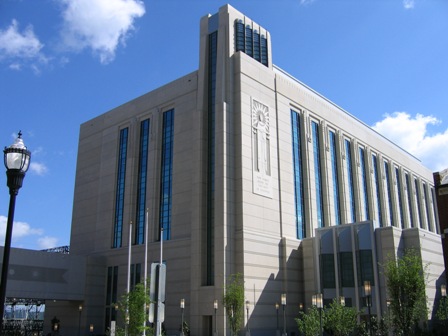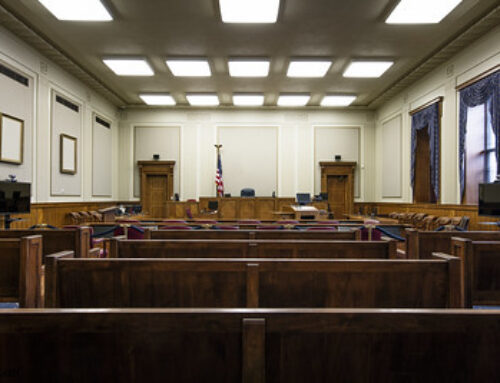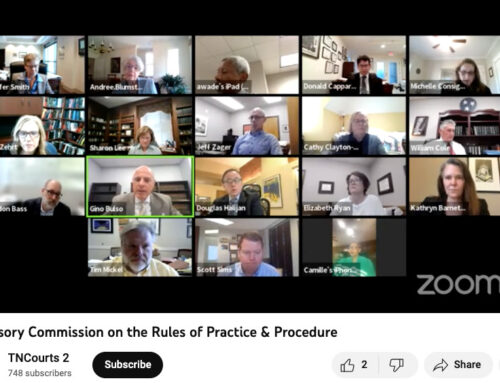Justice groups, TCOG ask Davidson County judges to allow public access to courts

Citing examples of family members who have been turned away at the door, several criminal justice groups and Tennessee Coalition for Open Government asked Davidson County criminal court and general sessions judges Thursday to modify court plans to allow public access either in person or through video-conferencing.
“We are writing today as representatives of a diverse group of public interest organizations, many of which work with court-involved individuals and their families, to respectfully ask that you modify the orders of your respective courts so the public can obtain reliable access to court proceedings in the A.A. Birch Building.”
“Over the past several weeks, we have witnessed people come to the A.A. Birch Building to attend court hearings and get denied entry into the building. We have also heard countless reports from people our organizations serve who got turned away at the door.
“One man had driven all the way from Chattanooga to attend his son’s court date. Another man, who came to court with a friend (who did not speak English) to ‘translate’ for him, was also denied entry. This is unacceptable, particularly because all the courts operating in the Birch Building have not made virtual access to court proceedings readily accessible to the public.”
The groups asking for reliable public access to court proceedings include Nashville Community Bail Fund, No Exceptions Prison Collective, Vanderbilt Prison Project, Choosing Justice Initiative, Free Hearts and Tennessee Coalition for Open Government.
No remote viewing available for court proceedings

Rahim Buford, director of Nashville Community Bail Fund, who wrote the letter on behalf of the groups, noted that the Nashville court system has resumed “close to normal operations” and Nashville is moving into a modified Phase 3 stage, lifting some COVID-19 related restrictions.
“Despite this progress, the Criminal Court and General Sessions Court reopening plans — which expressly deny members of the public entry into the Birch Building — are still being enforced.”
“At the same time, those courts have not publicized information about whether remote viewing of court hearings through video technology is available, and if so, how to arrange for that.
“While some of us have arranged to view Criminal Court hearings, we have not always been successful in doing so, and we do not know how to do that for General Sessions Court. This is unacceptable, and contradicts the Orders issued by the Tennessee Supreme Court.
“Public access to court proceedings is vital to maintaining public trust in our legal system,” the letter said. “Secret hearings behind closed doors undermine accountability for government officials, and leave loved ones of those involved in court proceedings in the dark. Closing courthouse doors to the public is also antiethical to the rule of law, and threatens our democracy.”
Few Tennessee court plans assure public access to courts during COVID-19
The Tennessee Supreme Court earlier this year asked all judicial districts in Tennessee to submit plans for court operations during the COVID-19 pandemic.
TCOG reviewed all 31 submitted plans that were approved by the Supreme Court and found that few included information about how the public could access courtrooms if the judges decided to limit physical access for safety reasons. Many of the plans limited access to court proceedings to only the people directly involved and excluded family members or friends of defendants or victims.
Few plans offered guidance on public access, although a handful stated that journalists would be permitted to attend a court proceeding if they made requests in advance.
In June, TCOG, along with 55 other organizations that spanned criminal justice groups to news organizations, petitioned the Tennessee Supreme Court to take “immediate steps to protect the public’s Constitutional and common law right of access to court proceedings” during the COVID-19 epidemic.
The petition cited examples in the plans submitted by the judicial districts barring the public from physical access to courtrooms with no provisions for alternative access, such as video conferencing or telephone conferencing.
The Tennessee Supreme Court in July denied the petition, saying it had not approved an “outright ban” on public access to courts. The Court said it knew of no instances in which the public was denied access. But it encouraged individuals or the petitioners to share instances of the public being denied access if it happened.




